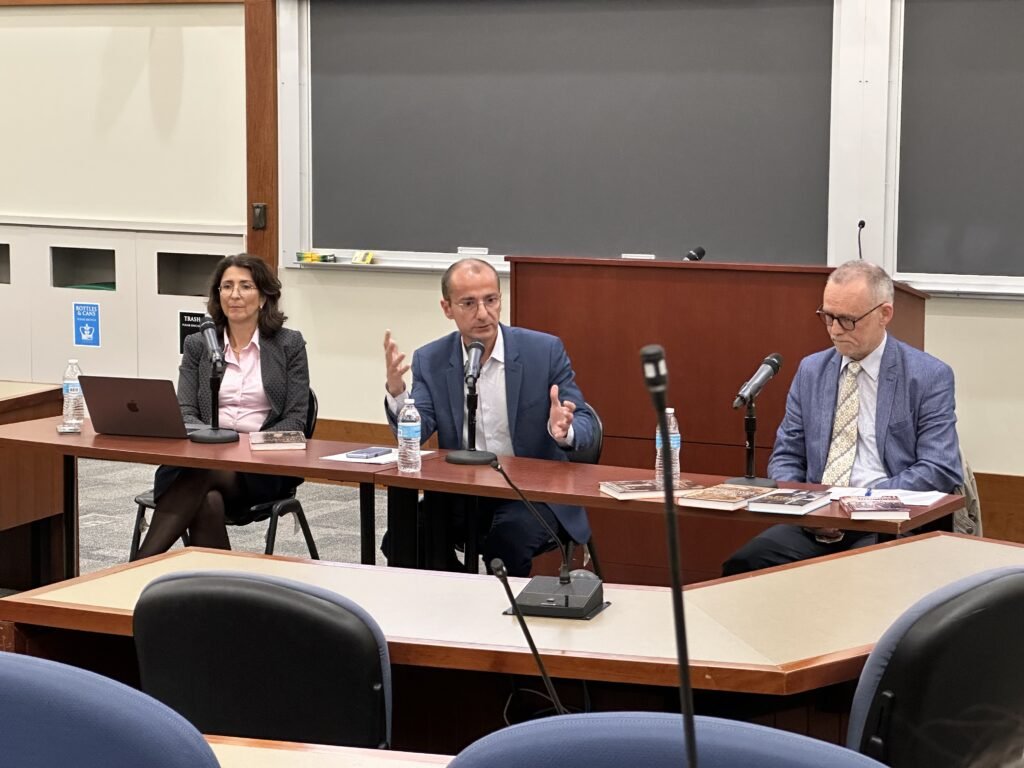NEW YORK—More than a century after the Armenian Genocide, issues of the politics of memory and denial of human rights abuses have reemerged with a new salience for the global Armenian community. Eleven eminent scholars of history, anthropology, literature and political science grapple with these questions in the anthology After the Ottomans: Genocide’s Long Shadow and Armenian Resilience. 
“Every image, snapshot and video of displacement from Artsakh is a trigger for hundreds of thousands of people scattered across the world, who see the reenactment of the crime committed more than a century ago that never went away,” said Khatchig Mouradian, the Armenian and Georgian Area Specialist at the Library of Congress and lecturer in Middle Eastern, South Asian and African Studies at Columbia University, during the book launch for After the Ottomans on September 25.
The book launch was held at the Columbia University School of Social Work (CSSW). Nicole Vartanian, Chief of the Staff of the CSSW Dean’s office, called the launch a timely opportunity to “honor the heroic resilience of the people of Artsakh” as Armenians “witness ethnic cleansing in real time,” in her introduction of the three panelists and editors of the anthology Hans-Lukas Kieser, Seyhan Bayraktar and Mouradian.
After the Ottomans addresses the “century-long consequences and persistent implications” of the Armenian Genocide. It is the “last and longest in the making,” in Kieser’s words, of a four-volume series focusing on “Ottoman Cataclysm.” The series posits that it is necessary to study the “massive transformation of the late-Ottoman world caused by persistent warfare between 1912 and 1922” to understand modern Turkey and the neighboring region.
“We took our time, 10 years, but we had to take our time to get it all,” said Kieser, a historian of Turkey, the Ottoman Empire and the modern Middle East at the University of Newcastle, Australia and the University of Zurich, Switzerland. He wrote the second chapter in the volume titled, “Return of the Suppressed: Ataturk’s History Doctrine, Islam and the Armenian Genocide.”
The panelists underscored that one cannot understand the politics and societies of contemporary Turkey and the South Caucasus without studying the Armenian Genocide and its reverberations into the modern day. This holds true for the Artsakh conflict, which devolved into a catastrophe last week when Azerbaijan attacked Artsakh, forcing the capitulation of its government and the displacement of thousands of local Armenians.
Bayraktar, who penned the third chapter in the book titled, “The past, the present and the politics of memory,” drew a parallel between the inaction of the international community in response to the crime of genocide over a century ago and its inaction today in response to the ethnic cleansing of Artsakh’s Armenian population. Met with the silence of the international community, she called appeals to “1915 Never Again” and to remember the genocide “bare cheap talk.”
“How is it that a crime that happened before the eyes of the world is [at risk] of being forgotten forever?” said Bayraktar, who is the Ph.D. coordinator at the Graduate School of the Faculty of Arts and Social Sciences at the University of Zurich in Switzerland, during the book launch.
Bayraktar argued that the international community is complicit in Turkey’s official policy of denying the Armenian Genocide, due to its failure to prosecute Turkey for committing genocide in its immediate aftermath. The lack of accountability enabled genocide denial for the century to follow, she said.
The legacy of genocide denial also shapes Turkey’s present foreign policy toward Armenia and Azerbaijan, according to Mouradian. He argued that the discourse of the Turkish government, which reinforces that of Azerbaijan, is “heavily influenced and colored by legacies of denial.” “Had Turkey meaningfully confronted its past, it is unfathomable that it would directly and unabashedly” support Azerbaijan’s military offensives against Armenia and Artsakh, said Mouradian, who wrote the first chapter in the book titled, “Dismantling Silence: Remembrance and Action under the Genocide’s Long Shadow.”
After the Ottomans also recognizes Armenians as central actors in their own history. It explores “the Ottoman Armenians not only as major victims of the First World War and the post-war treaties, but also as agents striving for survival, writing history, transmitting the memory and searching for justice.”
Mouradian says that media coverage and public discourse around genocide denial have not paid enough attention to the strides made by Armenians in mobilizing for justice and recognition.
“Armenian survivors and descendants have played and continue to play a central role in prompting action and shaping discourse on issues of the Armenian Genocide and its legacies,” Mouradian said.
Mouradian emphasized the prevalence of the theme of revenge among the survivor generation, who he said framed survival and revival as the best revenge against the perpetrators of the Genocide. Today, amid the crisis in Artsakh, the onus is on Armenians to learn from their ancestors and seek revenge through survival, Mouradian urged.



Where do you recommend we buy the book, to best support proceeds going to the authors or towards Armenian aide? Thank you.
The “best revenge” is not “to survive”, but to eventually recover Artsakh and Western Armenia, our ancestral lands, as a powerful state that is the true homeland of all Armenians. The rest legitimizes the crime of Genocide and homeland occupation, and advances our people’s extinction. Why be sheep when you can be lions?!